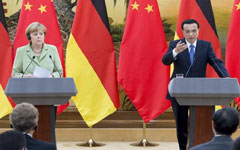HAMBURG - More needs to be done to promote Foreign Direct Investment between the European Union and China, which remains at relatively low levels, and Small and Medium Sized Enterprises (SMEs) need to play a bigger role in this process.
These were the main messages on the first day of the sixth "Hamburg Summit, China Meets Europe", which brought together high level delegations from Germany, China, and this year special guest country Luxembourg led by Prime Minister Xavier Bettel.
"SMEs in the EU boast of great strengths, advanced technologies, excellent skills and great competitiveness in capital and technology intensive industries, and the service sector, while SMEs in China are still in the stage of structural optimisation, transformation and upgrading," Li Yizhong, Chairman of China Federation of Industrial Economics (CFIE), told the conference.
He said both sides should step up policy support in areas like finance, technology transfer, commodity trade, and project investment, in an effort to facilitate Sino-EU SME cooperation.
 |
| China to send largest-ever delegation to Hamburg Summit |
 |
| China, Germany sign trade pacts |
With regard to the current economic transformation plan, moving China towards more domestic consumption and less dependence on exports, panellists noted that in the year since latest reform plan was launched, more private capital has been coming to those industries previously dominated by state-run enterprises, expecting the reform process to accelerate over next two years.
Professor Sebastian Heilmann, President of Mercator Institute for China Studies (MERICS) in Germany, noted it was very ambitious reform agenda, with a wave of reforms in many areas simultaneously.
Nonetheless, even though he acknowledged the complexity of this latest phase of economic reform, he suggested that the process can be even faster.
Looking at the theme of EU-China relations, CFIE's Li said that it was important for China and the EU to commit themselves to the optimisation of trade structure, and expanding of the open market, facilitating the shift from the trade-dominant bilateral economic and trade relations to the kind of relations that feature equal focus on trade and investment.
"Europe, known for high-end manufacturing and R&D strength, calls for more capital in its economic recovery," said Li. "Meanwhile, China boasts of a huge foreign reserve and vast market with great potential and its enterprises are stepping up their globalization process."
Therefore, two-way investment should be encouraged, and the service sector opened to each other should be further expanded, he said, urging greater efforts in the negotiations concerning Sino-European Bilateral Investment Treaty, and in the construction of comprehensive mutual investment mechanisms that would add more dynamic and vigour to the slow recovery of world economy.
INNOVATION
Other panellists stressed the need for more innovation and domestic research and development (R&D) spending in China, and the establishment of well known brands.
Guenter Butschek, Chief Operating Officer at Airbus, noted that factories in China are now designing as well as manufacturing parts for models such as the Airbus A350.
He is seeing more R&D in China, and more intellectual property belonging to Chinese companies, which will gradually change the focus from European companies wanting to protect their intellectual property.
Economic reform and more innovation by Chinese companies will make Europe and China more similar, which will increase the likelihood for joint solutions to problems in areas such as intellectual property rights enforcement, Butschek said.
He said rapid passenger growth at Chinese airports brings opportunities not only for aircraft manufacturers, but also in areas such as software and systems for air traffic management control.
Butschek also pointed to future competition for Airbus from aircraft models being developed by Comac (Commercial Aircraft Corporation of China). "We are concerned about Comac program, but it was clear to us that the current duopoly was not going to last forever, and competition is a healthy element in any kind of business," he said.
